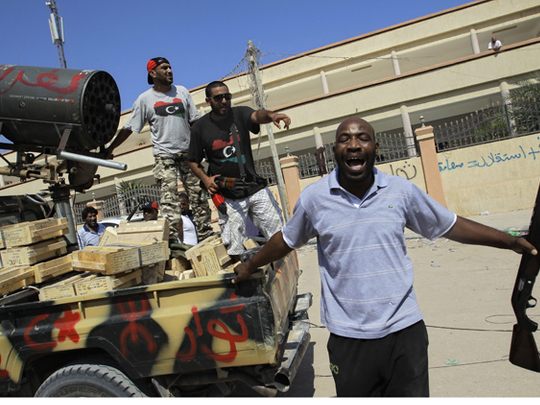
The successful toppling of Colonel Muammar Gaddafi's 42-year dictatorship in Libya is a big victory for forces of change in the Arab World. Yet more than six months into the Arab Spring there are still those who see doom and gloom and perpetual chaos everywhere.
To the eternal pessimists, the glass is not just half empty it is nearly shattered and holds no promise for the future. Unfortunately, this view is propagated by some influential circles inside and outside the Arab world.
On the other hand, the so-called realists come up with a more eclectic assessment of the Arab Spring. They see numerous positive developments since the beginning of 2011 as well as many difficult turn of events in places like Libya, Bahrain and Yemen and, of course, Syria, where regimes are not willing to give up without fight. Needlessly, the typically cautious realists see the Arab Spring glass as both half- full and half-empty.
But there is room for a more optimistic reading of the Arab Spring that sees the glass not just half but nearly full to the rim. This is the view of millions of activists who believe that after a long delay, the Arab freedom moment is finally here and, regardless of a few setbacks, the Arab world is better off six months into the Arab Spring than it was in January 2011.
In full swing
Suddenly forces of change have been unleashed in a massive way and the 40-year-old political stagnation era is about to end peacefully in some places and not so peacefully in other Arab countries.
The undisputed plus side to the Arab Spring is that the old and rigid status quo is melting down. A quick glance at the state of affairs in the region shows that there are already three cases of ‘done revolution', three other cases of ‘ongoing revolution' and a few cases of ‘pending revolution'. The region is moving forward and the Arab Spring is in full swing.
The net result of the Arab Spring so far is more than 100 million Arabs (82 million in Egypt alone) are happily emancipated. The combined energy of millions of free Arab men and women is bound to chart a different future for the region so used to one man, one party and one family regime.
The stigma of an Arab world that is the most undemocratic region on Earth is finally over. This is a huge historical gain and a qualitative change in the state of affairs for the region. Certainly, Morocco, Tunisia, Egypt and Libya are more democratic than they were just a few months ago.
They will probably make it in the upcoming annual Freedom House report of free states of the world. Pretty soon some 60 million more Arabs in Syria, Yemen and Bahrain will feel free too.
More than five million Libyans were liberated recently and celebrated their Eid like they have never done before. Millions are in total revolt against the 40-year-old republic of fear in Syria which is ripe for the post-Bashar Al Assad era.
The young revolutionaries in Yemen are not giving up one bit on their demand to end the one-man regime of Yemeni President Ali Abdullah Saleh who is convalescing in Riyadh since June 3.
Yet of all the transition to freedom, Egypt is the key in the region, because what happens in Egypt never stays in Egypt. No matter how things eventually shape up, the emerging Egypt, is going to be a more diversified Egypt.
All that the Arab world needs is just one credible, stable and prosperous democracy to serve as a role model and a trend setter. That has been lacking so far.
Egypt is well-placed to fill in the vacuum and is bound to play that leading role. The remaining Arab autocratic and non-democratic states will be in a politically-awkward position if they do not open up to winds of change and enact badly-needed political reform.
The one negative side of the Arab Spring is that the price for freedom has been daunting. The initial transition was remarkably swift and peaceful in Tunisia and Egypt. In other places the change has been bloody and protracted. Thousands of people have been killed, with an average of dozens dying every single day to inject freedom in Arab politics.
Despite the overwhelming odds, every Friday of the week, millions of Arabs continue to put up the needed fight for democracy. They are not likely to give up until the long overdue political stagnation is over and a new, more democratic political order is born. The best of the Arab freedom moment is yet to come and the Arab Spring is still in its first five minutes of the hour.
Abdulkhaleq Abdullah is a Professor of Political Science at Emirates University.








